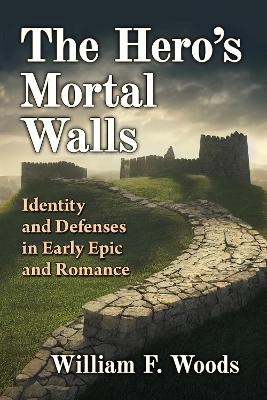
The Hero's Mortal Walls
Identity and Defenses in Early Epic and Romance
Seiten
2024
McFarland & Co Inc (Verlag)
978-1-4766-8623-3 (ISBN)
McFarland & Co Inc (Verlag)
978-1-4766-8623-3 (ISBN)
Analyses seven iconic heroes and compares each champion to a walled town or castle, hardened against an outer threat. By delving into some of early narrative’s most renowned heroes, the book reveals the pieces of their inner selves that even they cannot keep outside the walls but must finally accept with firm humility.
The heroes of early narrative are the faces of an older world. In constant retellings, their stories hold the memory like members of an extended family. Gilgamesh, Odysseus, Beowulf, Gawain, Roland, Yvain, Genji--in their colourful, often exaggerated ways, they show how the people of their own time and place liked to know themselves. The heroes embody their identity and reflect their culture.
Because their world was difficult and dangerous, every hero needed defensive strengths. This book analyses seven iconic heroes and compares each champion to a walled town or castle, hardened against an outer threat. These defenses are the mortal walls of their identity--their strengths against the world, as well as their dealings within it--and are exemplified in their actions as warriors, distinct rhetoric, complex relationships with women, and devotion to the divine. By delving into some of early narrative’s most renowned heroes, the book reveals the pieces of their inner selves that even they cannot keep outside the walls but must finally accept with firm humility.
The heroes of early narrative are the faces of an older world. In constant retellings, their stories hold the memory like members of an extended family. Gilgamesh, Odysseus, Beowulf, Gawain, Roland, Yvain, Genji--in their colourful, often exaggerated ways, they show how the people of their own time and place liked to know themselves. The heroes embody their identity and reflect their culture.
Because their world was difficult and dangerous, every hero needed defensive strengths. This book analyses seven iconic heroes and compares each champion to a walled town or castle, hardened against an outer threat. These defenses are the mortal walls of their identity--their strengths against the world, as well as their dealings within it--and are exemplified in their actions as warriors, distinct rhetoric, complex relationships with women, and devotion to the divine. By delving into some of early narrative’s most renowned heroes, the book reveals the pieces of their inner selves that even they cannot keep outside the walls but must finally accept with firm humility.
William F. Woods is the M.V. Hughes Professor of English, emeritus, at Wichita State University in Wichita, Kansas. He lives in Wichita.
Table of Contents
Preface
Introduction: Mortal Walls
Chapter One. Gilgamesh
Chapter Two. Odysseus
Chapter Three. Beowulf
Chapter Four. Gawain
Chapter Five. Roland
Chapter Six. Yvain
Chapter Seven. Genji
Epilogue
Chapter Notes
Bibliography
Index
| Erscheinungsdatum | 17.01.2024 |
|---|---|
| Verlagsort | Jefferson, NC |
| Sprache | englisch |
| Maße | 152 x 229 mm |
| Gewicht | 272 g |
| Themenwelt | Geisteswissenschaften ► Sprach- / Literaturwissenschaft ► Anglistik / Amerikanistik |
| Geisteswissenschaften ► Sprach- / Literaturwissenschaft ► Literaturwissenschaft | |
| ISBN-10 | 1-4766-8623-8 / 1476686238 |
| ISBN-13 | 978-1-4766-8623-3 / 9781476686233 |
| Zustand | Neuware |
| Haben Sie eine Frage zum Produkt? |
Mehr entdecken
aus dem Bereich
aus dem Bereich
Poetik eines sozialen Urteils
Buch | Hardcover (2023)
De Gruyter (Verlag)
CHF 83,90
Buch | Softcover (2024)
belleville (Verlag)
CHF 27,95


